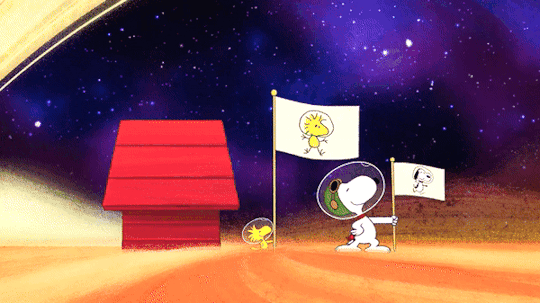Text

"Don't vote, fight"
Stencil seen in Mayagüez, Puerto Rico
101 notes
·
View notes
Text
why would you ever outsource fun to chatgpt? are you stupid? you can make mediocre shit by yourself too.
37K notes
·
View notes
Text
I just found out that all of my fucking ao3 fics were scraped to train a fucking ai. I had no clue until I saw a TikTok talking about it.
I did some digging, and if you want to check to see if your fics was scraped as well, if it has an ID number below 63 200 000, then you are safe. If it was locked or restricted, you’re most likely safe as well.
All of my works will be restricted for the time being, I know ao3 is filing a DMCA takedown for the person responsible but I don’t have much hope.
"Evil cannot create anything new, they can only corrupt and ruin what good forces have invented or made." - J. R. R. Tolkien
33 notes
·
View notes
Text
The Red Sponge: Spongebob’s Role in Enforcing an Oppressive, Capitalistic Society
Every millennial who grew up watching “Spongebob Squarepants” has come to the same horrifying conclusion: you have turned into Squidward. No matter how buoyant, how cheerful, how optimistic you were as a child, there comes a point where you begin to identify with Squidward more than any other character in the show.
You could explain this phenomenon with the disillusionment and cynicism of growing up, or the burdens of being a teenager in a post-John Hughes society. There is, however, an even simpler answer. Spongebob is an allegory for Karl Marx’s The Communist Manifesto. The show revolves around Spongebob, the hardworking proletariat, accepting a low-level fry cook job and enduring Mr. Krabs’ exploitation with a grin on his face.
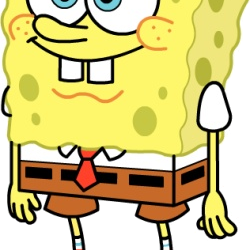
The face of compliance
It’s not hard to draw the parallels between Mr. Krabs and the bourgeoisie. He’s a cheapskate who underpays and overworks his employees for his own personal gain. Mr. Krabs famously ripped off his own arms (claws?) to retrieve a dime that fell down the drain. He took his workers on a boating trip to retrieve his millionth dollar from the jaws of a giant clam. He has zero regard for his employees’ safety and almost routinely puts them in danger for his own benefit. Mr. Krabs’ daughter, Pearl is an extension of the bourgeoisie archetype. She’s vain, self-centered, and largely unaware of others’ misfortune. She lives in a bubble, obsessed with clothes, makeup, and celebrities — because she has the leisure for such frivolities.

Remember when Pearl gentrified The Krusty Krab
Speaking of living in a bubble, Sandy is not exempt from analysis. Sandy is quite literally shielded away from the rest of the world. She represents the intellectual elite, using her privilege and higher education to jeopardize working class jobs and further the industrial revolution. Her endeavors into space mirror the Cold War-era “Space Race,” capitalism versus communism. Her voyage ends on the moon, just like the U.S.’s did. On top of her scientific record, Sandy is independent and self-sufficient, exemplifying capitalistic ideals of individualism.
If Sandy is the intellectual elite, then Patrick Star is just the opposite. Patrick represents the bourgeois caricature of the working class that capitalists want you to buy into. He is ignorant, undereducated, and lazy. He lives under a rock, likely because he can’t afford anything else — although he doesn’t seem to mind. Patrick appears to deserve his poverty because he does nothing but sleep, yet he also seems at peace with his lot. This idea of the happy, unproductive bum simultaneously vilifies and justifies the proletariat. “See, they’re poor because they just don’t work hard enough! In fact, they like being poor!” Patrick Star is arguably one of the most offensive cartoon depictions of this generation.
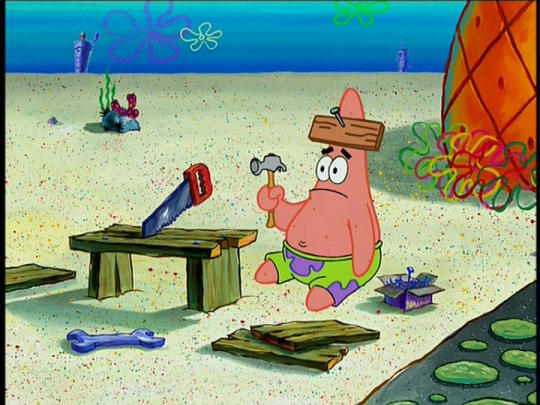
Blatant vilification of blue-collar workers
Spongebob, on the other hand, represents the ideal proletariat. Spongebob is hardworking, humble, and endlessly optimistic. He’s a lot like us before we realized the inherent evils of a capitalistic society. Day in and day out, Spongebob gleefully works a minimum-wage job flipping burgers with no hope of promotion. He’s a cog in Mr. Krabs’ greasy machine, but he doesn’t even realize it. He just continues to skip to work every day, chanting “I’m ready!”. Ready for what, Spongebob? Ready for the bourgeoisie Kool-aid he’s been absorbing through his poriferous sponge body.
Spongebob is the ideal worker, and as children, we aspired to be just like him. The very first episode of Spongebob showed him getting his first job as fry cook. According to the show, the very best achievement you could receive is being gainfully employed. Not only employed, but tirelessly productive and efficient to maximize your manager’s profits. Spongebob famously served busloads of anchovies at a never-before-seen pace. It wasn’t enough that Spongebob could perform his job well; he had to go above and beyond his duty in order to seem valuable. These are the principles we instilled in the youth of today. What went wrong?
Back, finally, to Squidward. Squidward isn’t like Spongebob or Patrick. He isn’t satisfied in his low-level employment. What Squidward seeks is artistic satisfaction and world renown. He covets the success of his employer without achieving the work ethic necessary for someone of his class to ascend. Squidward has realized that the cards have been stacked against him at every turn, and resigns himself bitterly to the clutches of capitalism. If Squidward were less jaded, he could be the catalyst to prompt full-scale class warfare, perhaps ending in a communist utopia. Unfortunately, Squidward’s defeatist personality and egoism prevents him from implementing social change.
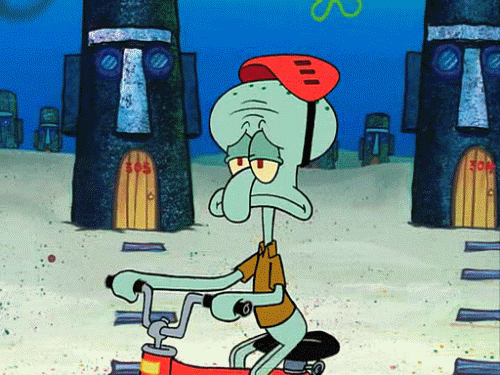
Mfw I realized I will never dismantle oppressive power structures that infiltrate our economic landscape
That is why we are all Squidward. We’ve uncovered the limits of capitalism and realized that hard work may not always pay off. We’ve begun to notice the oppressive economic and social structure that infiltrates our everyday life. We yearn for something higher, but feel that change is out of our reach. We become bitter, combative, self-deprecative, and cynical. There’s a reason Squidward is the unhappiest character on “Spongebob.” Not only for faults of his own, but for his own rotten luck. The show subliminally punishes Squidward for his views, hoping to prod viewers back towards Spongebob’s blithe, unfounded optimism.
Their efforts were to no avail. Millions of millennials are finding themselves disillusioned, realizing all along that Squidward was the reasonable one. He had a right to protest Mr. Krabs’ vile working conditions, and his sarcasm was merely a coping mechanism for the injustices placed against him. Squidward is the dissatisfied proletariat, and we identify with him more than ever. The difference is, we have the energy and collective power to succeed where he could not. Together, we can rise up and defeat the bourgeoisie, establishing an egalitarian society that does not prey on the lower classes. In the words of Spongebob, “I’m ready.” Are you?
55K notes
·
View notes
Text



TCOPTP CHAPTER 100
PLEASE THIS FIC IS SO GOOD I CANTTTTTT
Ty @motswolo for writing this masterpiece ❤️
2K notes
·
View notes
Text
marlene and sirius on a date, both in the closet:
marlene: *silence*
sirius: *more silence*
marlene: *even more silence*
marlene: I'm a lesbian
sirius: oh thank God, im gay
marlene: friends?
sirius: friends.
3K notes
·
View notes
Text

looks like James, blind like James, quidditch crazy like James
975 notes
·
View notes
Text
Remus who tells anyone who'll listen that his bf is the sweetest, kindest, most lovely adorable person on earth
And then people meet Sirius and he's the scariest and most intimidating individual they've ever met
325 notes
·
View notes
Text


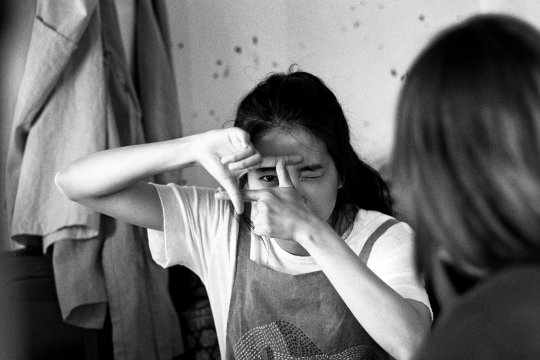
kim tae ri behind the scenes of little forest (2018)
154 notes
·
View notes
Text
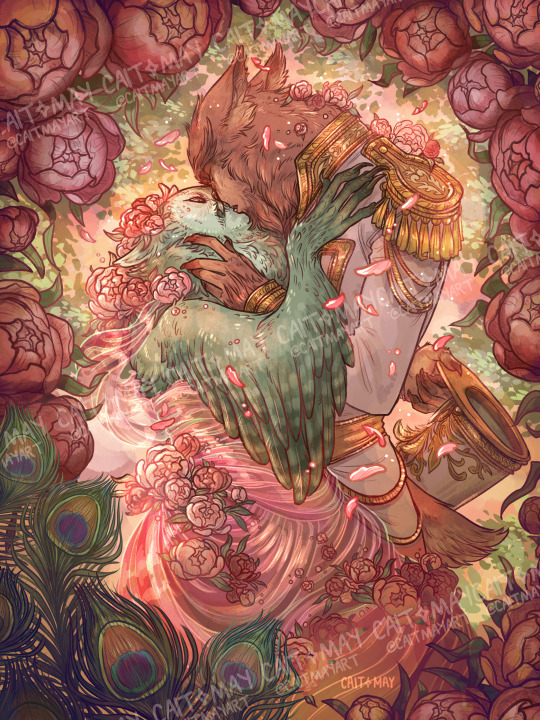
"You said that you felt alone. Never here. Not while I draw breath." Happy Valentine's Day ♥ 🌿🌸🪷🌺🌿
10K notes
·
View notes
Note
Spill the Stan is a death eater tea
thank you very much for the ask, anon!
i've been committed to believing ever since half-blood prince came out that stan shunpike is a genuine death eater - and not as crack, but as an example of how the series' politics flattening into a straightforward good-versus-evil narrative as the books reach their conclusion is at the detriment of what war, radicalisation, and resistance actually looks like.
stan's arrest in half-blood prince is unquestioningly presented in the text as nothing more than government corruption. there is never any suggestion that his charges are legitimate - arthur weasley tells us that he was imprisoned to let scrimgeour save face; harry then says this to scrimegour's face, and scrimgeour doesn't refute it.
but - more interestingly - nor is there any suggestion that stan's charges - illegitimate or not - might be plausible.
stan is arrested - to quote hermione - after he's "overheard talking about the death eaters' secret plans in a pub". all three members of the trio immediately decide that anything he's claimed to have said can be totally dismissed as just someone who is demonstrably grandiose and attention-seeking chatting shit.
and sure, stan clearly does love a nonsensical boast. i'm certainly not saying that i think that him - for example - claiming to be voldemort's right-hand man [and therefore in charge of some intricate, high-level, thrilling, and dangerous mission] would be anything close to the truth.
but i think it's really striking that none of the trio ever considers that stan might not only have been overheard talking about the death eaters' plans in a way which implied insider knowledge of voldemort's actions, but in a way which expressed ideological support for them.
that is to say, the trio don't learn of his arrest and assume that he's one of voldemort's ordinary foot soldiers making himself look more important than he is by pretending that he's a marked death eater in the dark lord's inner circle... they assume that any pro-voldemort sentiment he may have expressed isn't something he genuinely believes.
[which is then built upon in deathly hallows, when stan's appearance among voldemort's forces during the seven potters chase is dismissed by harry - without any real pushback - as being the result of him being under the imperius curse.]
the doylist text undoubtedly intends harry's interpretation of things to be understood as correct. throughout the series, harry is shown to be someone with incredibly good intuition when it comes to working out people's motivations and loyalties. his immediate dislike of characters such as draco malfoy, gilderoy lockhart, and dolores umbridge is entirely justified. his immediate trust in characters such as sirius is the same.
his only misjudgments relate to characters who are crucial to the narrative outside of his personal feelings towards them - harry's wrong to trust the teenage tom riddle in chamber of secrets, he’s wrong to trust the fake “moody” in goblet of fire, he’s wrong to trust “bathilda bagshot” in deathly hallows, and he is, of course, wrong about both snape and dumbledore.
since stan isn't important to the narrative outside of harry's own views, then, the reader is clearly intended to think that harry's assessment is right - which [given that arthur and harry's conversation about stan's illegitimate imprisonment comes the day before scrimgeour arrives at the burrow, tells him umbridge still works for the ministry, and tries to get him to be a poster-boy for the government] primes the reader to regard scrimgeour as an antagonist, his ministry as corrupt, and the state as fundamentally useless to the anti-voldemort cause.
[and - of course - it also makes the reader think of sirius, similarly falsely imprisoned by a ministry which was more concerned with looking effective than it was with justice.]
however...
throughout the series, the positive character trait which is harry's good intuition has a flip-side which is less so - that the judgements he reaches on people are self-serving. harry tends to regard people as good [and right] if they're nice to him personally and bad [and wrong] if they're cruel to him - and to be very, very unwilling to deviate from this black-and-white assessment of people unless he's forced into nuance by something he's unable to ignore.
the most obvious example of this in canon is the fact that harry is totally unwilling to criticise sirius' treatment of kreacher - because sirius is kind to him and harry loves him, and kreacher is unkind to him and harry loathes him - until the revelations about kreacher's involvement in retrieving the locket [and a series of stone-cold banger quotes from hermione] compel him to acknowledge that sirius could be a good man and simultaneously deserving of criticism for the absolute contempt he showed towards his slave.
[and harry will continue on this journey of learning to see people in shades of grey throughout deathly hallows - the conclusion of which depends on him being able to acknowledge both dumbledore and snape as flawed, contradictory people, neither wholly good nor wholly bad.]
harry's conviction that stan's arrest is illegitimate is rooted in this tendency towards making definitive, self-interested judgements without considering factors other than his own personal feelings on the matter. harry thinks that stan is ridiculous and irritating, and he also clearly thinks that he isn't very clever or sophisticated and that his lies are so over-the-top that they can always be spotted - and that this [plus the fact that stan is perfectly kind to him on the occasions they meet in canon] therefore means that he's fundamentally harmless, and anyone assuming that he would be capable of something dark is misguided at best.
but stan is also a young, working-class man [something the text communicates via how it writes him speaking with an accent], who's stuck in what is undoubtedly a low-paying, dead-end job, and who presumably lacks any connections who might help him advance beyond the limits his class-status sets for him.
[not least because - given how the text presents him as speaking and behaving - there's no way he went to hogwarts...]
for someone whose operation seems to have so much to do with the upper echelons of wizarding society - and whose posher supporters clearly believe, at least until deathly hallows, that his ultimate goal is pureblood oligarchy - it's really striking in canon that voldemort's support among the non-elite of wizarding britain seems to be considerable. the snatchers who capture the trio - for example - are all written with regional accents and/or speaking non-standard dialects of british english, which is the series' standard way of communicating to the reader that they're supposed to be understood as working class.
[and that their class-status is supposed to be understood as indicating that they lack a certain amount of sophistication and intelligence... how kind of you, joanne...]
the most plausible explanation - based on what we see in the text - for why and how snape was radicalised into becoming a death eater is to assume that voldemort offered him a way to transcend the limitations placed upon him by his blood-status, class-background, and financial situation in a society which is obsessed with blood, lineage, and correct adherence to elite social convention. and, connected to this, there are hints in canon - especially in deathly hallows - that voldemort and his regime are happy to be understood as populist.
[the "mudbloods steal magic" line put about by the muggleborn registration commission is clearly accompanied by "mudbloods steal your jobs and resources", for example - since "runcorn" - really harry in disguise - is congratulated for ousting the muggleborn dirk cresswell from his post so that a non-muggleborn man who thinks he deserves the position can feel "confident" that he'll get the job...]
due to the doylist text's massively unradical worldview, the thing the good guys are defending from voldemort is the status quo. the order of the phoenix's aim is not only to preserve the state and its institutions broadly unchanged, but to preserve the social structures of the wizarding world broadly unchanged as well [blood-supremacy is out post-voldemort, but the class-system clearly isn't] - and the text thinks that all will be well after the war not because the system is going to be radically torn down and made anew, but because the people in charge of it are good.
[the watsonian explanation for this is that the good guys are - with the exception of mundungus "working-class-and-therefore-feckless" fletcher - all from middle-class-or-above class-backgrounds and all beneficiaries of an elite education and the social cachet this confers, and that a certain lack of understanding of how the state is experienced by people who don't have this status often follows on from this.]
but i think it's interesting - and, tbh, important - to interrogate this more than canon does, and to recognise that there is a lot about the status quo the order is seeking to defend which places someone like stan not just on an uneven playing field, but buried underneath the pitch, with only his over-active imagination for company and no way of getting out.
and one way of doing this is to imagine that the death eaters - like many terrorist groups throughout history - recognise [while the order do not] that stan is someone stuck, greedily dreaming of power and success the status quo can't offer him, and decide to come along with a spade and dig him up...
119 notes
·
View notes
Text
I don't care if you're poor, if you join the us army out of poverty to murder people, every person in the global south or within the diaspora has the unconditional right to fucking hate you
5K notes
·
View notes
Text

That's because the cheap labor is the point.
The purpose of the police has always been protecting rich people's profits and guaranteeing them a source of laborers who they can treat as property. That has never changed.
Corporations that hire undocumented immigrants can be like, "Obey me and tolerate my abuse or I'll call ICE and have you deported." They then don't have to obey those pesky "workers' rights" laws. The police know this and happily enforce this because it's their job and it always has been.
261 notes
·
View notes
Link
18 notes
·
View notes










